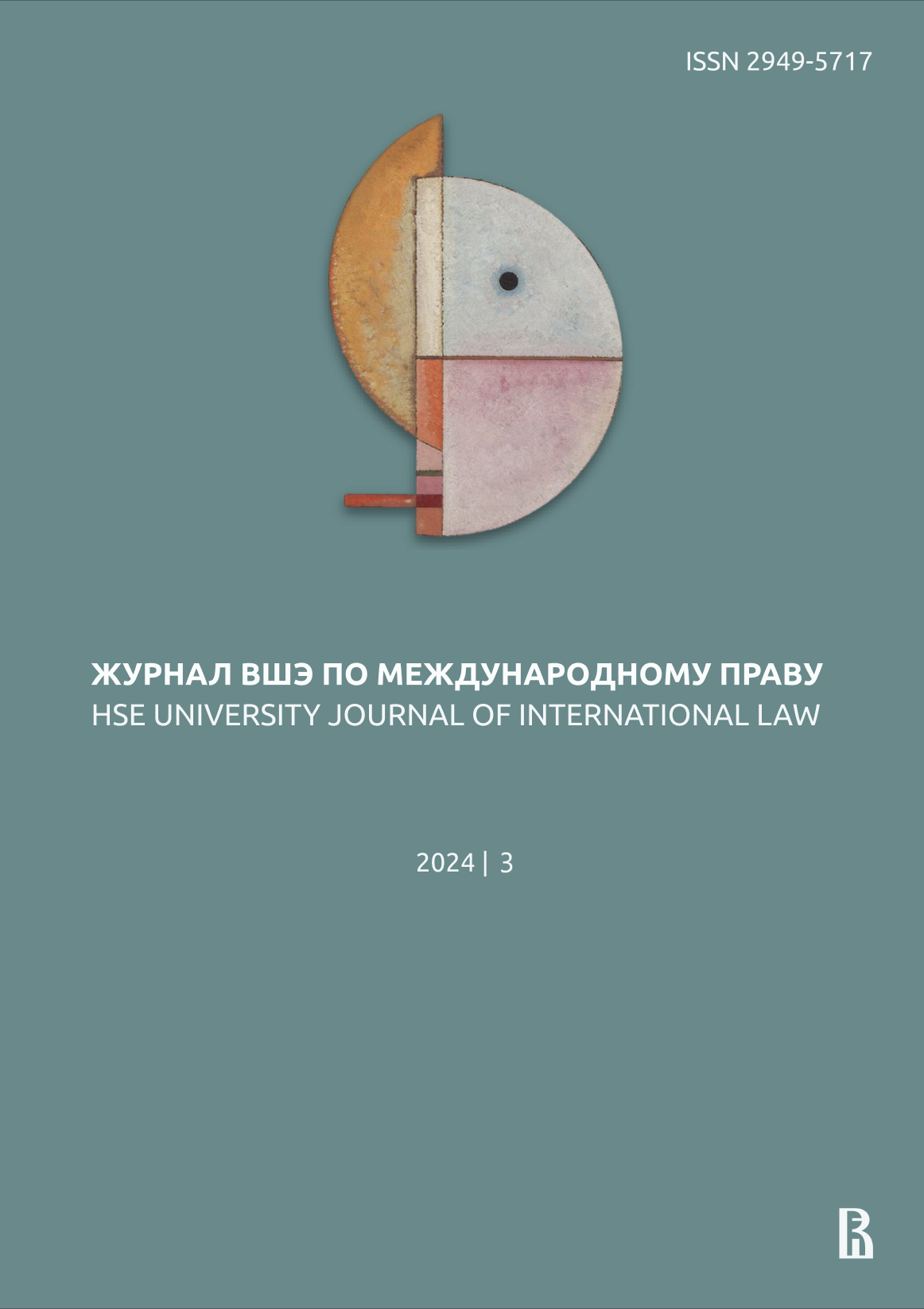Compensation for Damage to Natural Resources versus Compensation for Environmental Damage (On the Example of Resolving the Dispute Between the Democratic Republic of Congo and Uganda)
Abstract
In a case brought against Uganda in 1999, the Democratic Republic of Congo (hereinafter — DRC) asked the International Court of Justice (hereinafter — ICJ, the Court) to order Uganda to pay it $11 billion in compensation for deaths, looting, damage to natural resources and general economic damage caused by Uganda's military occupation of DRC regions. After lengthy proceedings, the ICJ ruled in 2005 that Uganda had violated international law by occupying parts of the eastern DRC region and supporting other armed groups during the conflict. In doing so, the Court directed the parties to reach a negotiated amount of compensation. In May 2015, DRC asked the Court to reopen the proceedings to address the issue of reparations for the failure of negotiations with Uganda. In February 2022, the ICJ judges finally ordered Uganda to pay $325 million in five annual instalments of $65 million beginning in September 2022. The Court divided the compensation into different categories of damages, including an estimate of $60 million for natural resource damages, including the looting of gold, diamonds, timber, and other resources by Ugandan forces or the rebels they supported. The article critically analyses the Court's approach to determining the calculation of compensation purely for natural resource damage rather than for environmental damage for the destruction of flora and fauna, comparing it with other similar cases in international practice. The conclusion is made that the approach used by the Court does not contribute to the development of uniformity in the assessment of damage in the period of armed conflict and a recommendation is made to develop a document on the methodology of calculation of environmental damage in the period of armed conflicts within the framework of United Nations Environment Programme.
Downloads
References
Bendel J. (2022) Conspicuous by Absence: Why Did the DRC Receive No Compensation for Deforestation at the ICJ? Available at: https://opiniojuris.org/2022/04/14/conspicuous-by-absence-why-did-the-drc-receive-no-compensation-for-deforestation-at-the-icj (accessed: 20.07.2024).
Crawford J. (2022) The ILC’s Articles on State Responsibility: Introduction, Text and Commentaries. Cambridge: Cambridge University Press. DOI: https://doi.org/10.2307/3100134
Desierto D. (2022) The International Court of Justice’s 2022 Reparations Judgment in DRC v. Uganda: ‘Global Sums’ as the New Device for Human Rights-Based Inter-State Disputes. Available at: https://www.ejiltalk.org/the-international-court-of-justices-2022-reparations-judgment-in-drc-v-uganda-a-new-methodology-for-human-rights-in-inter-state-disputes (accessed: 20.07.2024).
Feighery T. J., Gibson C. S., Rajah T. M. (eds.) (2015) War Reparations and the UN Compensation Commission: Designing Compensation After Conflict, Oxford University Press. DOI: https://doi.org/10.1093/acprof:oso/9780199389735.001.0001
Gray C. (2014) Remedies. In: Romano C. et al. (eds.) The Oxford Handbook of International Adjudication, Oxford: Oxford University Press. DOI: https://doi.org/10.1093/law/9780199660681.003.0040
Greenwood C. (2022) The International Court of Justice and the Development of International Humanitarian Law. International Review of the Red Cross, vol. 104, nos. 920–921, pp. 1840–1855. DOI: https://doi.org/10.1017/s181638312200100x
Harrison J. (2022) Significant International Environmental Law Developments: 2021–22. Journal of Environmental Law, vol. 34, no. 3, pp. 499–515. DOI: https://doi.org/10.1093/jel/eqac015
Houtte H., Das H., Delmartino B. (2006) The United Nations Compensation Commission. In: Grief P. de (ed.) The Handbook of Reparations, Oxford University Press. DOI: https://doi.org/10.1093/0199291926.003.0010
Keburiya K. O., Solntsev A. M. (2021) Znachenie Osnovnykh printsipov i rukovodyashchikh polozheniy OON o prave na zashchitu i vozmeshchenie ushcherba 2005 g. [The Significance of the 2005 UN Basic Principles and Guidelines on the Right to a Remedy and Reparation]. Moskovskiy zhurnal mezhdunarodnogo prava, vol. 2, pp. 78–98 (In Russian). DOI: https://doi.org/10.24833/0869-0049-2021-2-87-98
Ostrouhov N.V., Solntsev A.M. (2022) Nekotorye novatsii v sfere zashchity okruzhayushchey sredy do, v period i posle vooruzhennykh konfliktov [Some Innovations in the Field of Environmental Protection Before, During and After Armed Conflicts]. Mezhdunarodnyy pravovoy kur'er, no. 5. pp. 46–49. Available at: https://inter-legal.ru/nekotorye-novatsii-v-sfere-zashhity-okruzhayushhej-sredy-do-v-period-i-posle-vooruzhennyh-konfliktov (accessed: 20.07.2024). (In Russian)
Paparinskis M. (2020) A Case Against Crippling Compensation in International Law of State Responsibility. Modern Law Review, vol. 83, no. 6, pp. 1246–1286. DOI: https://doi.org/10.1111/1468-2230.12562
Payne C., Sand P. (eds.) (2011) Gulf War Reparations and the UN Compensation Commission: Environmental Liability, New York: Oxford University Press. DOI: https://doi.org/10.2307/2189332
Reis T. H. (2011) Compensation for Environmental Damage under International Law: the Role of the International Judge. Wolters Kluwer.
Rudall J. (2018) Certain Activities Carried Out by Nicaragua in the Border Area (Costa Rica v. Nicaragua). American Journal of International Law, vol. 112, no. 2, pp. 288–294. DOI: http://doi.org/10.1017/ajil.2018.29
Rudall J. (2020) Compensation for Environmental Damage Under International Law, Routledge. DOI: https://doi.org/10.4324/9780429341496
Sean M. D., Kidane W., Snider T. (2013) Litigating War: Mass Civil Injury and the Eritrea–Ethiopia Claims Commission, Oxford University Press. DOI: http://doi.org/10.1017/S0002930000002037
Shelton D. (2015) Remedies in International Human Rights Law, Oxford University Press. DOI: https://doi.org/10.1093/law/9780199588824.001.0001
Sidorova G.M. (2011) Voennye konflikty v demokraticheskoy Respublike Kongo na rubezhe XX–XXI vekov i ih osobennosti [Military Conflicts in the Democratic Republic of the Congo at the Turn of the XX–XXI Centuries and Their Features]. Vestnik Volgogradskogo gosudarstvennogo universiteta, vol. 20, no. 2, pp. 81–89. Available at: https://cyberleninka.ru/article/n/voennye-konflikty-v-demokraticheskoy-respublike-kongo-na-rubezhe-xx-xxi-vekov-i-ih-osobennosti (accessed: 20.07.2024) (In Russian). DOI: http://doi.org/10.15688/jvolsu4.2011.2.11
Sidhu B. (2022) International Court of Justice (ICJ). Yearbook of International Environmental Law, vol. 33, no. 1, pp. 225–229. DOI: https://doi.org/10.1093/yiel/yvaa012
Solntsev A .M. (2019) Deyatel'nost' Kompensatsionnoy komissii OON po vozmeshcheniyu ekologicheskogo ushcherba posle vooruzhennogo konflikta mezhdu Irakom i Kuveytom [Activities of the UN Compensation Commission for Compensation for Environmental Damage after the Armed Conflict between Iraq and Kuwait]. In: Abashidze A. (ed.) Blizhniy Vostok i mezhdunarodnoe pravo: monografiya [Middle East and International Law], Moscow: RUDN, pp. 203–214. (In Russian).
Solntsev A. M. (2022) Otsenka èkologicheskogo ushcherba Mezhdunarodnym sudom OON v dele ob opredelennykh vidakh deyatel'nosti, osushchestvlennykh Nikaragua v pogranichnom rayone (Kosta-Rika protiv Nikaragua) [Assessment of Environmental Damage by the International Court of Justice in the Case of Certain Types of Activities Carried out by Nicaragua in the Border Area (Costa Rica v. Nicaragua)]. In: Abashidze A. (ed.) Mezhdunarodnoe pravo: praktiko-orientirovannyy kurs [International Law: a Practice-Oriented Course], Moscow: RUDN, pp. 68–77. (In Russian).
This work is licensed under CC BY-NC-ND 4.0


